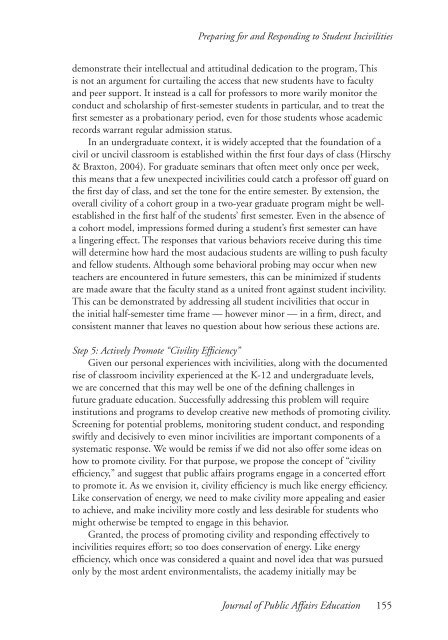JOURNAL OF PUBLIC AFFAIRS EDUCATION - Naspaa
JOURNAL OF PUBLIC AFFAIRS EDUCATION - Naspaa
JOURNAL OF PUBLIC AFFAIRS EDUCATION - Naspaa
Create successful ePaper yourself
Turn your PDF publications into a flip-book with our unique Google optimized e-Paper software.
Preparing for and Responding to Student Incivilitiesdemonstrate their intellectual and attitudinal dedication to the program, Thisis not an argument for curtailing the access that new students have to facultyand peer support. It instead is a call for professors to more warily monitor theconduct and scholarship of first-semester students in particular, and to treat thefirst semester as a probationary period, even for those students whose academicrecords warrant regular admission status.In an undergraduate context, it is widely accepted that the foundation of acivil or uncivil classroom is established within the first four days of class (Hirschy& Braxton, 2004). For graduate seminars that often meet only once per week,this means that a few unexpected incivilities could catch a professor off guard onthe first day of class, and set the tone for the entire semester. By extension, theoverall civility of a cohort group in a two-year graduate program might be wellestablishedin the first half of the students’ first semester. Even in the absence ofa cohort model, impressions formed during a student’s first semester can havea lingering effect. The responses that various behaviors receive during this timewill determine how hard the most audacious students are willing to push facultyand fellow students. Although some behavioral probing may occur when newteachers are encountered in future semesters, this can be minimized if studentsare made aware that the faculty stand as a united front against student incivility.This can be demonstrated by addressing all student incivilities that occur inthe initial half-semester time frame — however minor — in a firm, direct, andconsistent manner that leaves no question about how serious these actions are.Step 5: Actively Promote “Civility Efficiency”Given our personal experiences with incivilities, along with the documentedrise of classroom incivility experienced at the K-12 and undergraduate levels,we are concerned that this may well be one of the defining challenges infuture graduate education. Successfully addressing this problem will requireinstitutions and programs to develop creative new methods of promoting civility.Screening for potential problems, monitoring student conduct, and respondingswiftly and decisively to even minor incivilities are important components of asystematic response. We would be remiss if we did not also offer some ideas onhow to promote civility. For that purpose, we propose the concept of “civilityefficiency,” and suggest that public affairs programs engage in a concerted effortto promote it. As we envision it, civility efficiency is much like energy efficiency.Like conservation of energy, we need to make civility more appealing and easierto achieve, and make incivility more costly and less desirable for students whomight otherwise be tempted to engage in this behavior.Granted, the process of promoting civility and responding effectively toincivilities requires effort; so too does conservation of energy. Like energyefficiency, which once was considered a quaint and novel idea that was pursuedonly by the most ardent environmentalists, the academy initially may beJournal of Public Affairs Education 155
















